Are you planning a European adventure? Knowing what you need when traveling to Europe is crucial for a smooth and enjoyable trip, and TRAVELS.EDU.VN is here to ensure you’re fully prepared. From essential documents and adaptable clothing to the right electronics and travel accessories, we’ll guide you through every aspect, ensuring you have everything for an unforgettable experience.
1. Essential Documents: What Paperwork Do You Need When Traveling to Europe?
Having the correct documentation is paramount when traveling internationally. What paperwork do you need when traveling to Europe?
-
Passport: Your passport is your most important document, and it must be valid for at least three months beyond your planned stay in the Schengen Area. According to the Schengen Area requirements, your passport should also have been issued within the last 10 years.
-
Visa (if required): Depending on your nationality, you may need a Schengen Visa to enter Europe. Citizens of the United States, Canada, Australia, and the UK do not require a visa for stays up to 90 days. However, it’s essential to verify the specific requirements based on your citizenship on the official website of the embassy or consulate of the countries you plan to visit.
-
Driver’s License: If you intend to rent a car, bring your driver’s license. An International Driving Permit (IDP) is also recommended, especially if your license is not in English. AAA provides IDPs, which can be useful for navigating local traffic laws.
-
Travel Insurance: Comprehensive travel insurance is a must. It should cover medical emergencies, trip cancellations, lost luggage, and other unforeseen events. Allianz Travel Insurance and World Nomads are reputable providers.
-
Copies of Important Documents: Keep digital and physical copies of your passport, visa, driver’s license, and insurance policy. Store them separately from the originals.
-
Vaccination Records: Depending on the current global health situation, you may need proof of vaccination or a negative COVID-19 test. Check the latest health advisories from the World Health Organization (WHO) and the European Centre for Disease Prevention and Control (ECDC).
-
Flight and Accommodation Confirmations: Print or save digital copies of your flight tickets, hotel reservations, and any tour bookings.
-
Emergency Contact Information: Carry a list of emergency contact numbers, including your embassy or consulate, insurance provider, and family members.
2. What Clothes Should You Pack When Traveling to Europe?
Packing the right clothes ensures you are comfortable and prepared for various weather conditions and activities. What clothes should you pack when traveling to Europe?
-
Versatile Clothing Items: Pack clothing items that can be mixed and matched to create different outfits. This helps you minimize the number of items you need to bring while maximizing your wardrobe options.
- Tops: Include a mix of short-sleeved and long-sleeved shirts in neutral colors like white, black, and gray. These can be easily paired with different bottoms.
- Bottoms: Pack versatile pants or jeans that can be dressed up or down. Consider bringing a pair of comfortable chinos or travel pants.
- Dresses/Skirts: If you enjoy wearing dresses or skirts, pack a few that can be worn during the day or for evening outings.
-
Layering Options: Europe’s weather can be unpredictable, so layering is key.
- Sweaters/Cardigans: Pack a lightweight sweater or cardigan that can be easily layered over a t-shirt or blouse.
- Jackets: A versatile jacket, such as a trench coat, leather jacket, or denim jacket, is essential for cooler days and evenings.
-
Comfortable Footwear: You’ll likely be doing a lot of walking, so comfortable shoes are a must.
- Walking Shoes: Choose comfortable walking shoes with good support. Brands like Brooks, Ecco, and Allbirds are known for their comfort and durability.
- Dress Shoes: Pack a pair of dressier shoes for evenings out or formal occasions.
*Note: Avoid flip-flops, except for pool visits.
-
Underwear and Socks: Bring enough underwear and socks for the duration of your trip, or plan to do laundry.
-
Accessories: Accessories can elevate your outfits and add versatility.
- Scarves: Pack a lightweight scarf for warmth and style.
- Hats: A hat can protect you from the sun or keep you warm in cooler weather.
- Jewelry: Bring a few pieces of jewelry to dress up your outfits.
-
Seasonal Considerations: Adjust your packing list based on the season you’re traveling in.
- Summer: Pack light, breathable fabrics like cotton and linen. Don’t forget swimwear if you plan to visit beaches or pools.
- Winter: Pack warm layers, including a heavy coat, gloves, a hat, and thermal underwear.
According to a survey by Condé Nast Traveler, travelers often regret not packing enough comfortable shoes or weather-appropriate clothing. Plan ahead and check the weather forecast before you pack to avoid these common mistakes.
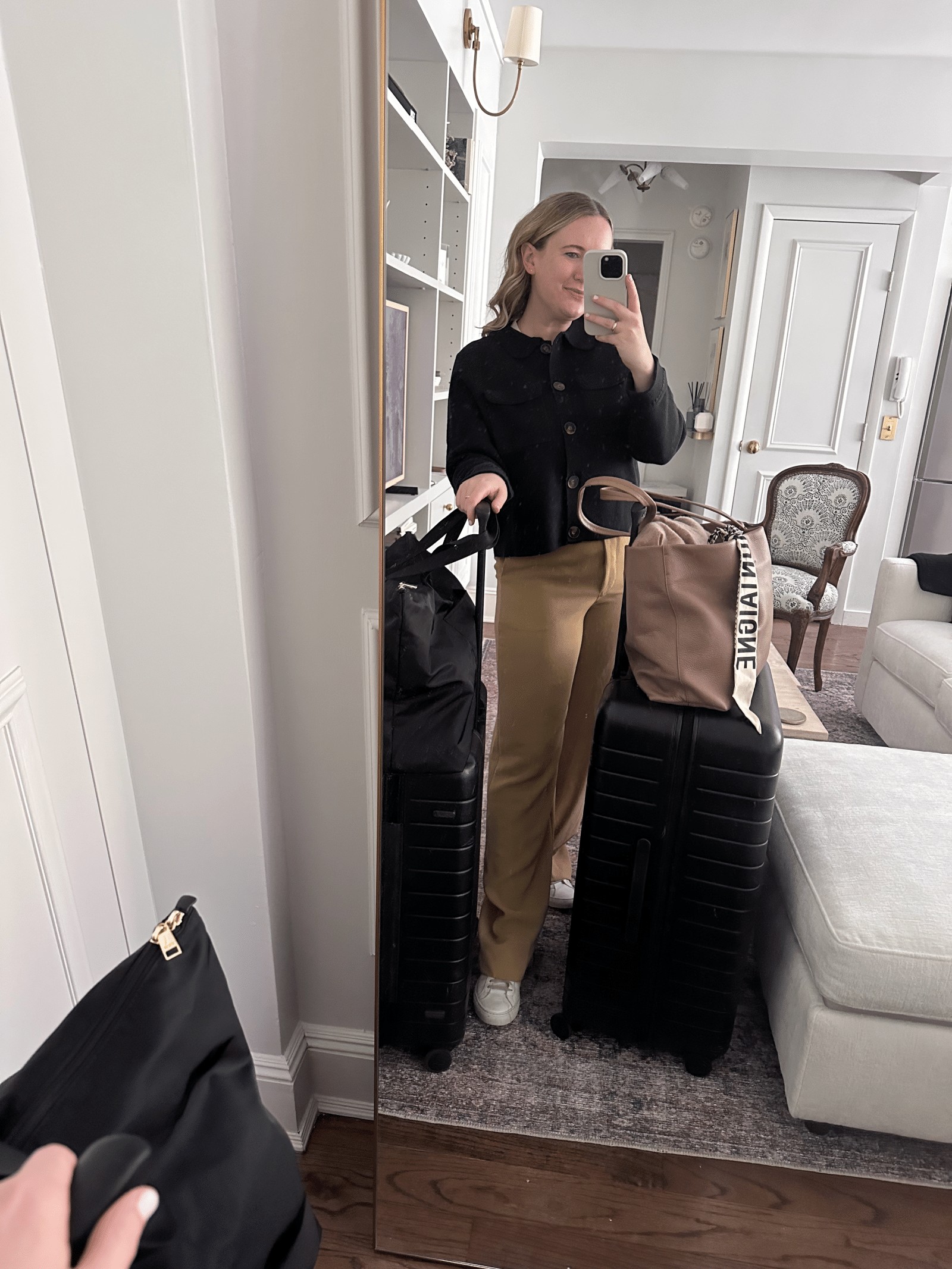 Travel Outfit
Travel Outfit
3. What Toiletries Should You Pack When Traveling to Europe?
Packing the right toiletries ensures you stay fresh and comfortable throughout your trip. What toiletries should you pack when traveling to Europe?
- Basic Toiletries:
- Toothbrush, Toothpaste, and Floss: Essential for maintaining oral hygiene. Consider travel-sized options to save space.
- Shampoo, Conditioner, and Body Wash: Decant your favorite products into travel-sized containers or purchase travel-sized versions to comply with liquid restrictions.
- Deodorant: Choose a travel-sized deodorant to stay fresh on the go.
- Sunscreen: Protect your skin from the sun, especially during the summer months. Opt for a broad-spectrum sunscreen with an SPF of 30 or higher.
- Insect Repellent: If you plan to visit areas with mosquitoes or other insects, pack insect repellent to avoid bites.
- Skincare Products:
- Cleanser, Toner, and Moisturizer: Maintain your skincare routine while traveling. Use travel-sized containers to save space.
- Makeup Remover: Remove makeup before bed to keep your skin healthy.
- Lip Balm: Prevent dry lips, especially in dry or cold climates.
- Medications:
- Prescription Medications: Bring enough of your prescription medications to last the entire trip. Keep them in their original containers and carry a copy of your prescription.
- Over-the-Counter Medications: Pack pain relievers, allergy medication, anti-diarrheal medication, and any other over-the-counter medications you may need.
- Personal Care Items:
- Hairbrush and Hair Ties: Keep your hair neat and tidy.
- Razor and Shaving Cream: For shaving needs.
- Feminine Hygiene Products: If needed, bring enough feminine hygiene products to last the trip or plan to purchase them locally.
- First-Aid Kit:
- Band-Aids: For minor cuts and scrapes.
- Antiseptic Wipes: To clean wounds.
- Pain Relievers: Such as ibuprofen or acetaminophen.
- Motion Sickness Medication: If you are prone to motion sickness.
According to the Mayo Clinic, it’s important to pack a basic first-aid kit with essential medications and supplies to handle minor health issues while traveling.
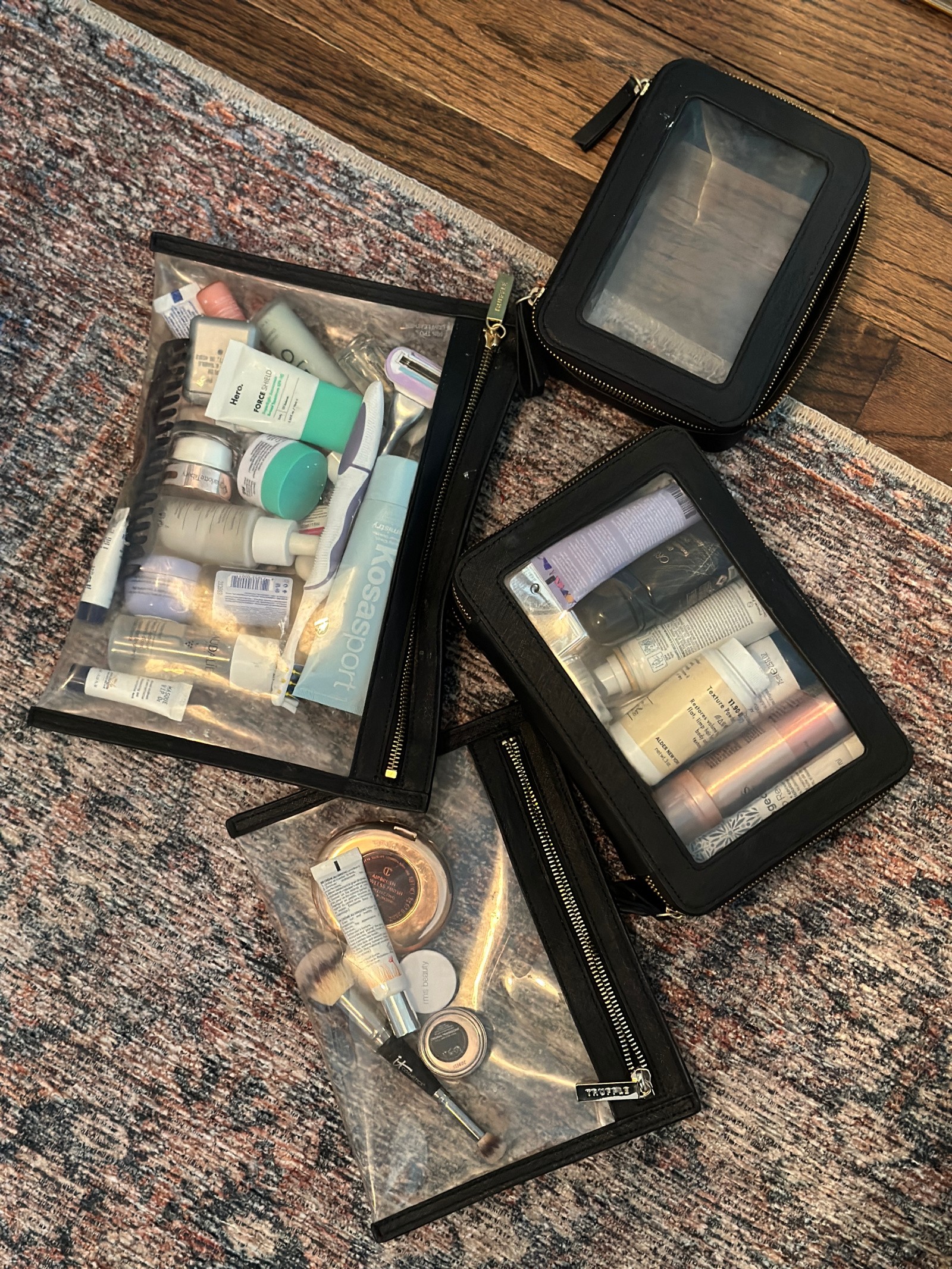 Toiletries Packing List
Toiletries Packing List
4. What Electronics and Accessories Do You Need When Traveling to Europe?
Carrying the right electronics and accessories can greatly enhance your travel experience. What electronics and accessories do you need when traveling to Europe?
- Adapters and Converters:
- Plug Adapters: Europe uses different electrical outlets than the US. Pack a universal plug adapter to charge your devices.
- Voltage Converter: If your devices are not dual voltage (110-240V), you’ll need a voltage converter to prevent damage.
- Charging Devices:
- Portable Charger: A portable charger is essential for keeping your devices powered up on the go.
- USB Charging Hub: Charge multiple devices at once with a USB charging hub.
- Mobile Phone and Accessories:
- Unlocked Phone: Consider using an unlocked phone and purchasing a local SIM card for cheaper data and calls.
- Phone Case: Protect your phone with a durable case.
- Camera and Accessories:
- Camera: Capture your travel memories with a good camera.
- Extra Batteries and Memory Cards: Ensure you have enough power and storage for your photos and videos.
- Tripod: A compact tripod can be useful for taking steady shots.
- Entertainment:
- Headphones: Noise-canceling headphones can make long flights and train rides more enjoyable.
- E-reader or Tablet: Load up on books or movies for entertainment.
- Navigation:
- GPS Device or Smartphone with GPS: Use a GPS device or smartphone with GPS to navigate unfamiliar areas. Download offline maps for use without an internet connection.
- Other Useful Accessories:
- AirTags: Keep track of your luggage with Apple AirTags.
- Portable Fan: Useful for staying cool in hot weather, especially since air conditioning is not as common in Europe.
- Water Bottle: Stay hydrated by bringing a reusable water bottle.
According to a survey by Travel + Leisure, travelers rate portable chargers and noise-canceling headphones as the most essential electronics for travel.
 Packing Electronics for Europe
Packing Electronics for Europe
5. Travel Bags: What Type of Bags Should You Pack When Traveling to Europe?
Selecting the right travel bags is essential for a comfortable and organized trip. What type of bags should you pack when traveling to Europe?
- Main Luggage:
- Suitcase: A rolling suitcase is a popular choice for its ease of use. Look for one with spinner wheels and a telescoping handle. Brands like Away and Samsonite are known for their durability.
- Backpack: A travel backpack can be a good option if you prefer to keep your hands free. Look for one with a comfortable suspension system and plenty of compartments. Brands like Osprey and Tortuga are popular among travelers.
- Carry-On Bag:
- Carry-On Suitcase: A smaller rolling suitcase that meets airline carry-on size restrictions.
- Travel Backpack: A smaller backpack that can fit under the seat or in the overhead compartment.
- Personal Item Bag:
- Tote Bag: A versatile tote bag can be used for carrying essentials like your phone, wallet, and travel documents.
- Crossbody Bag: A crossbody bag is a secure and convenient way to carry your valuables. Look for one with anti-theft features.
- Packing Organizers:
- Packing Cubes: Packing cubes help you organize your clothes and compress them to save space.
- Toiletry Bag: Keep your toiletries organized and separate from your clothes with a toiletry bag.
- Shoe Bags: Protect your clothes from dirty shoes by using shoe bags.
- Other Useful Bags:
- Collapsible Duffle Bag: A collapsible duffle bag can be useful for bringing home souvenirs or extra items.
- Money Belt: A money belt can provide extra security for your valuables.
According to a survey by SmarterTravel, travelers who use packing cubes report being more organized and less stressed during their trips.
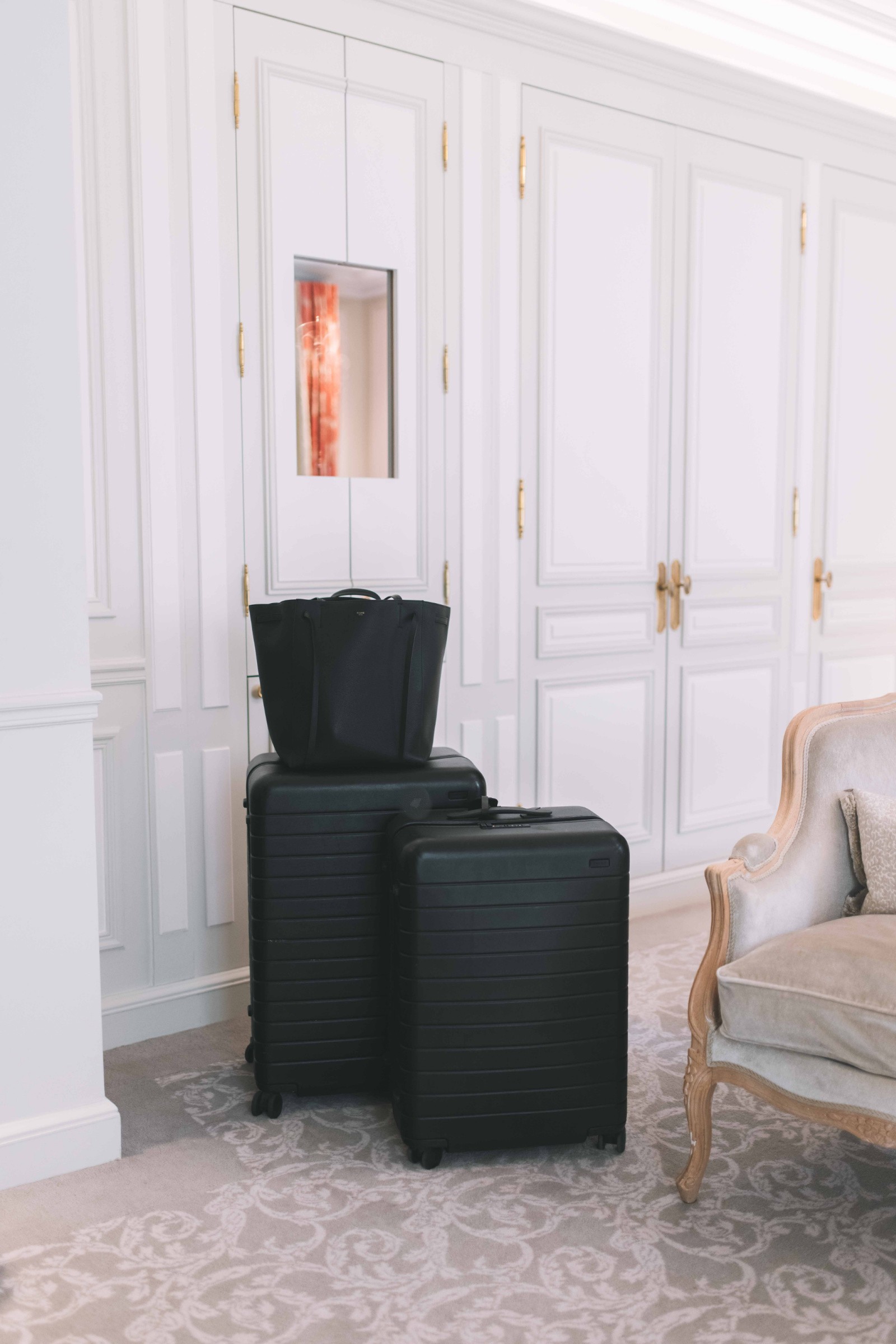 Luggage Essentials
Luggage Essentials
6. Best Packing Tips for Traveling to Europe: How Can You Pack Efficiently for a Trip to Europe?
Packing efficiently can make your trip more enjoyable and less stressful. How can you pack efficiently for a trip to Europe?
- Make a Packing List:
- Start Early: Begin creating your packing list a few weeks before your trip. This gives you time to think about what you need and avoid last-minute stress.
- Categorize Items: Divide your list into categories like clothing, toiletries, electronics, and documents.
- Review and Revise: Review your list regularly and make adjustments as needed.
- Plan Your Outfits:
- Mix and Match: Choose clothing items that can be mixed and matched to create different outfits.
- Write Down Outfits: Write down your outfits for each day of your trip. This ensures you wear everything you pack and helps you avoid overpacking.
- Try On Outfits: Try on your outfits before you pack to make sure everything fits and looks good.
- Choose the Right Luggage:
- Consider Your Needs: Choose luggage that is the right size and type for your trip.
- Lightweight Luggage: Opt for lightweight luggage to avoid exceeding weight limits.
- Rolling Luggage: Rolling luggage is easier to transport, especially through airports and train stations.
- Use Packing Organizers:
- Packing Cubes: Use packing cubes to organize your clothes and compress them to save space.
- Toiletry Bag: Keep your toiletries organized and separate from your clothes with a toiletry bag.
- Shoe Bags: Protect your clothes from dirty shoes by using shoe bags.
- Roll Your Clothes:
- Save Space: Rolling your clothes instead of folding them can save space in your luggage.
- Reduce Wrinkles: Rolling your clothes can also help reduce wrinkles.
- Utilize Empty Space:
- Stuff Socks and Underwear: Stuff socks and underwear into shoes to maximize space.
- Fill Empty Containers: Fill empty containers with small items like jewelry or accessories.
- Leave Behind Non-Essentials:
- Be Realistic: Be realistic about what you will actually need on your trip.
- Leave Behind Duplicates: Avoid packing multiple items that serve the same purpose.
- Consider Buying Locally: If you forget something, consider buying it locally rather than packing it.
- Check the Weather:
- Weather Forecast: Check the weather forecast for your destination before you pack.
- Pack Accordingly: Pack clothing that is appropriate for the expected weather conditions.
- Weigh Your Luggage:
- Avoid Overweight Fees: Weigh your luggage before you leave home to avoid overweight fees at the airport.
- Use a Luggage Scale: Use a luggage scale to accurately weigh your bags.
According to a study by the University of California, travelers who use a packing list are less likely to forget essential items and more likely to pack efficiently.
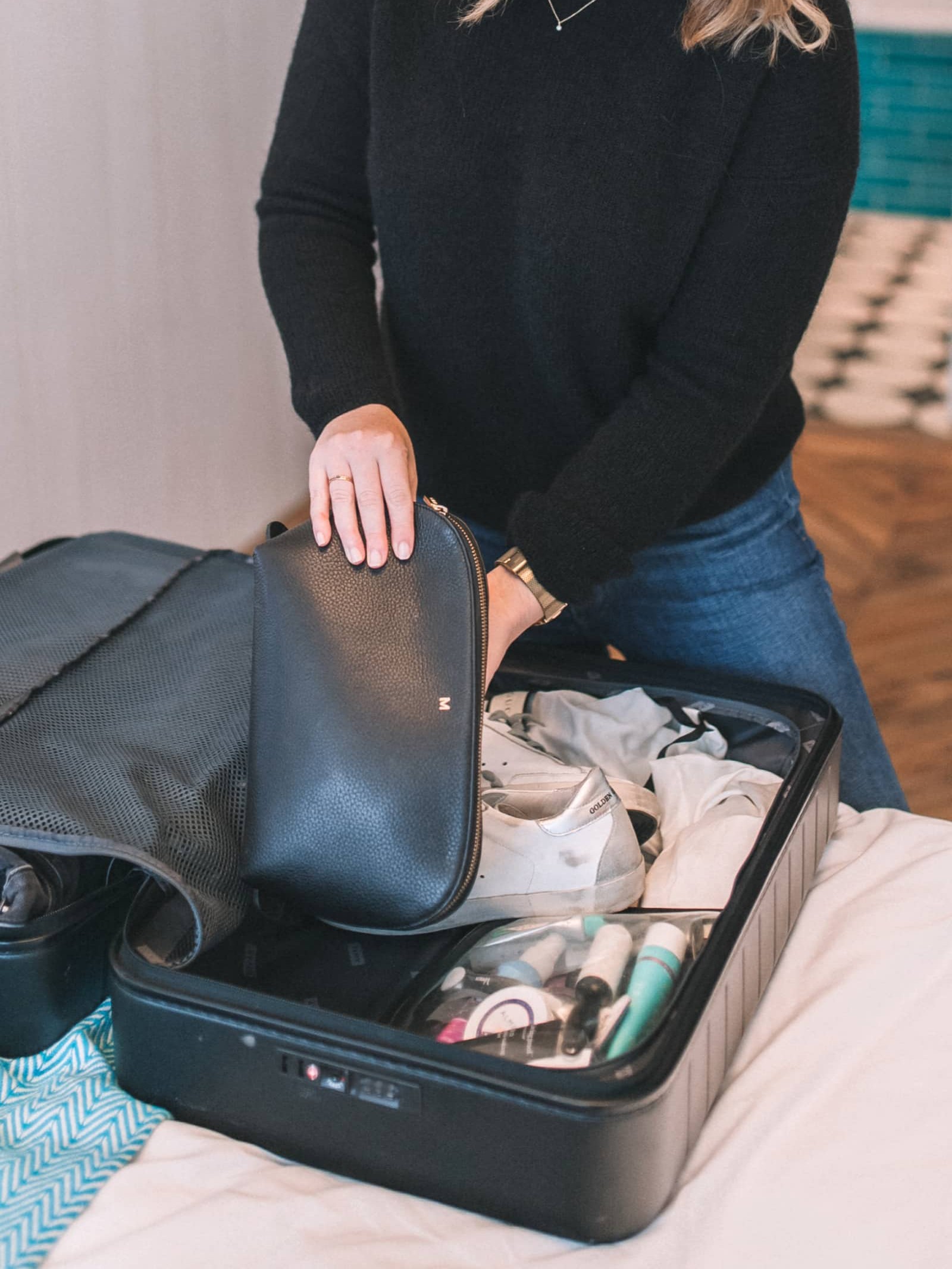 Packing for Europe
Packing for Europe
7. How to Stay Safe When Traveling in Europe?
Safety is paramount when traveling abroad. How to stay safe when traveling in Europe?
- Be Aware of Your Surroundings:
- Pay Attention: Pay attention to your surroundings and be aware of potential hazards.
- Avoid Distractions: Avoid distractions like using your phone while walking in crowded areas.
- Protect Your Valuables:
- Keep Valuables Secure: Keep your valuables in a secure place, such as a money belt or a hidden pocket.
- Avoid Displaying Wealth: Avoid displaying expensive jewelry or electronics in public.
- Be Cautious with Strangers:
- Trust Your Instincts: Trust your instincts and be cautious of strangers who approach you.
- Avoid Isolated Areas: Avoid walking alone in isolated areas, especially at night.
- Use Secure Transportation:
- Reputable Transportation: Use reputable transportation services, such as licensed taxis or ride-sharing apps.
- Avoid Unmarked Vehicles: Avoid getting into unmarked vehicles or accepting rides from strangers.
- Protect Your Identity:
- Guard Your Personal Information: Guard your personal information and avoid sharing it with strangers.
- Use Secure Wi-Fi Networks: Use secure Wi-Fi networks when accessing sensitive information.
- Be Prepared for Emergencies:
- Emergency Contact Information: Carry a list of emergency contact numbers, including your embassy or consulate.
- Travel Insurance: Have comprehensive travel insurance that covers medical emergencies and other unforeseen events.
- Stay Informed:
- Local News: Stay informed about local news and events that may affect your safety.
- Travel Advisories: Check travel advisories from your government for any safety concerns.
- Secure Accommodations:
- Reputable Hotels: Stay in reputable hotels or accommodations with good security measures.
- Lock Doors and Windows: Always lock doors and windows when you leave your room.
- Use ATMs Safely:
- Secure ATMs: Use ATMs located in secure areas, such as inside banks or shopping malls.
- Cover the Keypad: Cover the keypad when entering your PIN to prevent it from being seen by others.
- Be Mindful of Scams:
- Common Scams: Be aware of common scams, such as pickpocketing, fake petitions, and unsolicited offers.
- Avoid Being Pressured: Avoid being pressured into making quick decisions or giving money to strangers.
According to a report by the U.S. Department of State, being aware of your surroundings and protecting your valuables are the most important steps you can take to stay safe while traveling abroad.
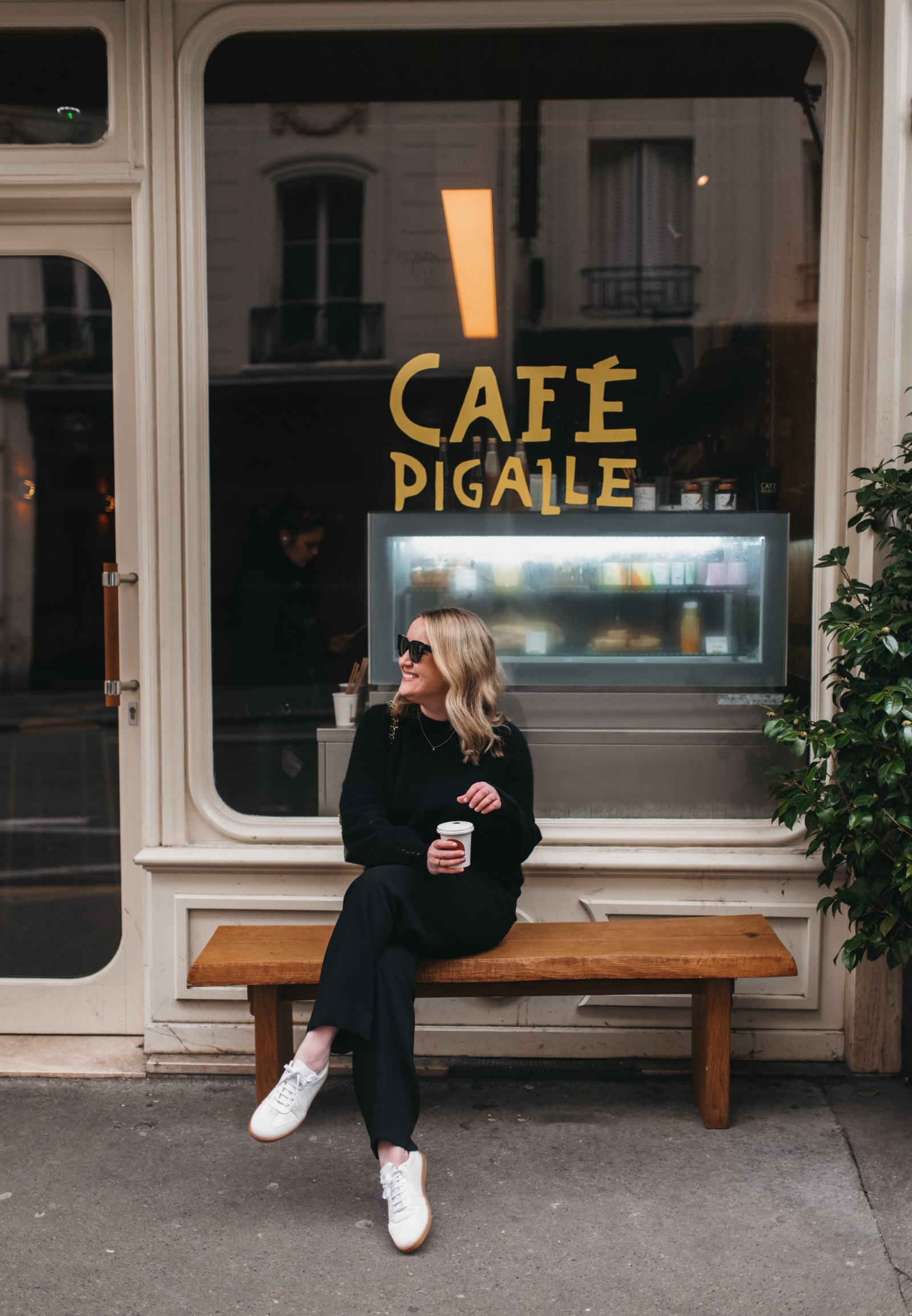 Paris Cafe
Paris Cafe
8. What to Do About Currency and Payments When Traveling in Europe?
Managing your finances effectively is essential for a smooth trip. What to do about currency and payments when traveling in Europe?
- Currency:
- Euro (EUR): Most European countries use the Euro (EUR) as their currency.
- Other Currencies: Some countries, like the United Kingdom (GBP), Switzerland (CHF), and Denmark (DKK), use their own currencies.
- Exchanging Currency:
- Before You Go: Exchange some currency before you go to have cash on hand for immediate expenses.
- ATMs: Use ATMs to withdraw local currency at your destination. ATMs typically offer better exchange rates than currency exchange services.
- Avoid Airport Exchange Services: Avoid using currency exchange services at airports, as they often have high fees and unfavorable exchange rates.
- Credit and Debit Cards:
- Notify Your Bank: Notify your bank of your travel plans to avoid having your cards blocked.
- Credit Cards with No Foreign Transaction Fees: Use credit cards with no foreign transaction fees to avoid extra charges.
- Chip and PIN Cards: Most European merchants use chip and PIN cards, so make sure your cards are compatible.
- Cash vs. Card:
- Cash for Small Purchases: Use cash for small purchases, such as coffee or souvenirs.
- Card for Larger Purchases: Use credit or debit cards for larger purchases, such as hotel bills or restaurant meals.
- Budgeting:
- Create a Budget: Create a budget for your trip and track your spending.
- Allow for Unexpected Expenses: Allow for unexpected expenses, such as transportation delays or medical emergencies.
- Tipping:
- Tipping Practices: Tipping practices vary across Europe. In some countries, tipping is not expected, while in others, it is customary to tip a small amount.
- Research Tipping Customs: Research the tipping customs of the countries you plan to visit.
- Mobile Payment Apps:
- Popular Apps: Consider using mobile payment apps like Apple Pay or Google Pay for contactless payments.
- Check Availability: Check the availability of mobile payment apps in the countries you plan to visit.
- Emergency Funds:
- Separate Account: Keep some emergency funds in a separate account in case of theft or loss of your primary cards.
- Keep Records:
- Track Expenses: Keep records of your expenses to help you stay within your budget.
- Receipts: Save receipts for tax purposes or to claim reimbursement from your insurance provider.
According to a survey by Visa, travelers who use a combination of cash and credit cards tend to have better control over their spending and avoid unnecessary fees.
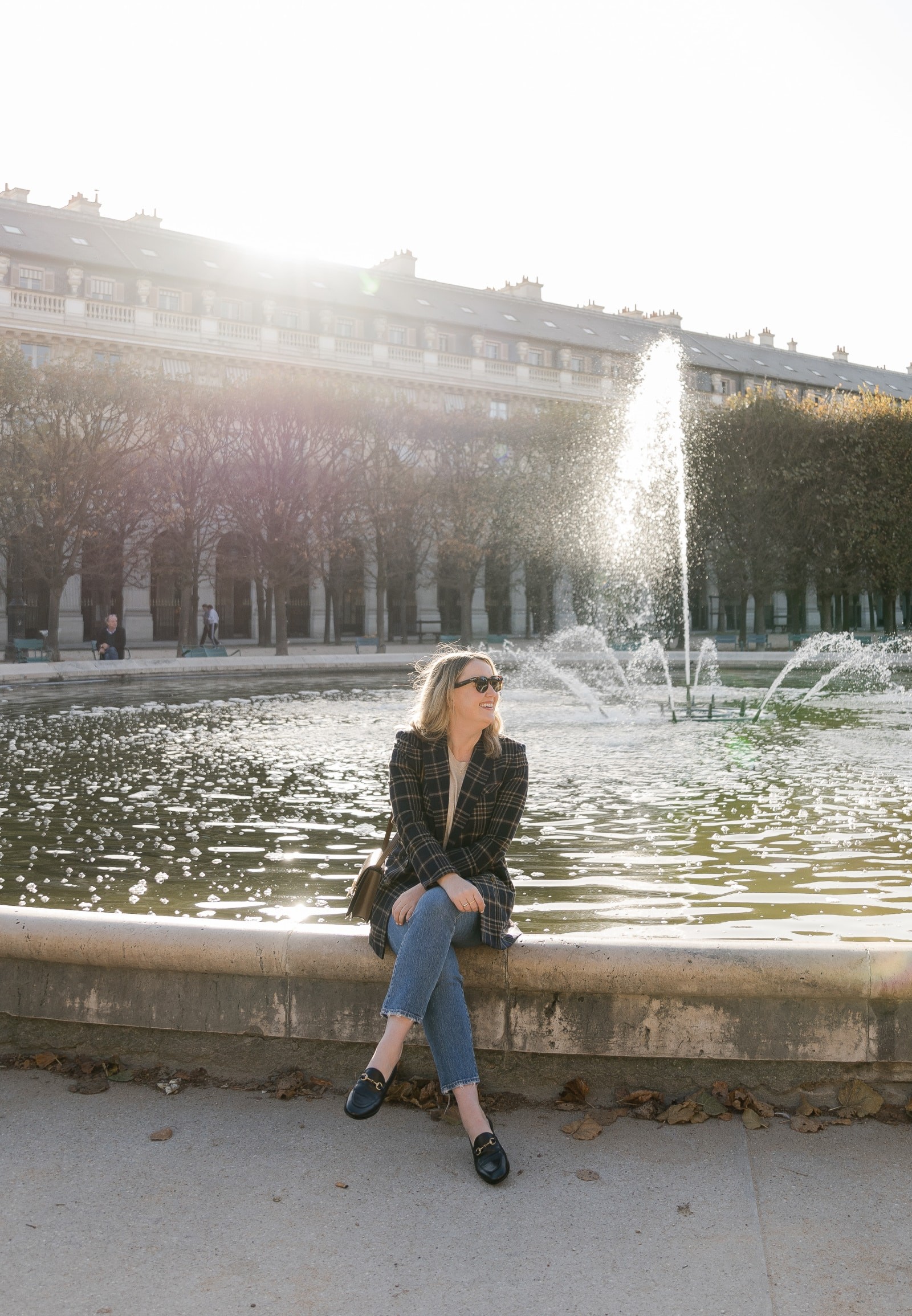 Plaid Blazer Outfit
Plaid Blazer Outfit
9. What Are Some Cultural Considerations When Traveling in Europe?
Respecting local customs and traditions can enhance your travel experience and prevent misunderstandings. What are some cultural considerations when traveling in Europe?
- Greetings:
- Verbal Greetings: Learn how to say “hello” and “thank you” in the local language.
- Physical Greetings: Pay attention to physical greetings, such as handshakes, kisses on the cheek, or bows.
- Dining Etiquette:
- Table Manners: Practice good table manners, such as keeping your elbows off the table and waiting for everyone to be served before eating.
- Tipping: Understand the tipping customs of the country you are visiting.
- Dress Code:
- Appropriate Attire: Dress appropriately for the occasion. In some countries, it is customary to dress more formally for certain events or religious sites.
- Religious Sites: When visiting religious sites, dress modestly and cover your shoulders and knees.
- Communication:
- Language Barriers: Be patient and understanding when communicating with people who do not speak your language.
- Non-Verbal Communication: Pay attention to non-verbal cues, such as body language and facial expressions.
- Public Behavior:
- Noise Levels: Be mindful of noise levels in public places, especially in residential areas or during quiet hours.
- Public Displays of Affection: Be aware of cultural norms regarding public displays of affection.
- Respect for Local Customs:
- Research Customs: Research the local customs and traditions of the countries you plan to visit.
- Be Open-Minded: Be open-minded and respectful of cultural differences.
- Photography:
- Permission: Ask for permission before taking photos of people, especially in rural areas or at cultural events.
- Restrictions: Be aware of photography restrictions at certain sites, such as museums or religious sites.
- Environmental Awareness:
- Littering: Avoid littering and dispose of your trash properly.
- Conserve Resources: Conserve resources, such as water and electricity.
- Learn Basic Phrases:
- Essential Phrases: Learn a few essential phrases in the local language, such as “hello,” “thank you,” “excuse me,” and “where is the bathroom?”
- Be Polite and Courteous:
- Show Respect: Show respect for the local culture and traditions by being polite and courteous to everyone you meet.
According to a study by the United Nations World Tourism Organization (UNWTO), travelers who respect local customs and traditions are more likely to have positive and enriching travel experiences.
 Trench Coat Outfit
Trench Coat Outfit
10. How Can TRAVELS.EDU.VN Help You Plan Your European Trip?
Planning a European trip can be overwhelming, but TRAVELS.EDU.VN is here to make the process easy and enjoyable. How can TRAVELS.EDU.VN help you plan your European trip?
- Customized Itineraries:
- Tailored Plans: We create customized itineraries based on your interests, budget, and travel style.
- Expert Recommendations: Our travel experts provide recommendations for the best destinations, activities, and accommodations.
- Accommodation Booking:
- Wide Range of Options: We offer a wide range of accommodation options, from budget-friendly hostels to luxury hotels.
- Best Prices: We negotiate the best prices for our clients to ensure they get the most value for their money.
- Transportation Arrangements:
- Flights: We assist with booking flights, including finding the best deals and convenient routes.
- Train and Bus Tickets: We help with booking train and bus tickets for seamless travel between cities.
- Car Rentals: We arrange car rentals for those who prefer to explore at their own pace.
- Tour Packages:
- Guided Tours: We offer guided tours of popular attractions and landmarks.
- Themed Tours: We provide themed tours, such as food tours, wine tours, and historical tours.
- Travel Insurance:
- Comprehensive Coverage: We offer comprehensive travel insurance to protect you against unexpected events.
- Peace of Mind: Travel with peace of mind knowing that you are covered in case of medical emergencies, trip cancellations, or lost luggage.
- 24/7 Support:
- Dedicated Support Team: Our dedicated support team is available 24/7 to assist you with any questions or concerns.
- Assistance During Your Trip: We provide assistance during your trip to ensure a smooth and enjoyable experience.
- Local Insights:
- Insider Tips: We provide insider tips on the best local restaurants, shops, and hidden gems.
- Cultural Experiences: We help you discover authentic cultural experiences that you won’t find in guidebooks.
- Budget Planning:
- Cost Estimates: We provide cost estimates for your trip to help you plan your budget effectively.
- Money-Saving Tips: We offer money-saving tips to help you get the most out of your trip without breaking the bank.
- Visa Assistance:
- Visa Requirements: We provide information on visa requirements and assist with the application process.
- Up-to-Date Information: We keep you informed about any changes to visa regulations.
- Personalized Service:
- Attention to Detail: We pay attention to every detail to ensure your trip is perfect.
- Customer Satisfaction: Our goal is to provide exceptional customer service and ensure your satisfaction.
TRAVELS.EDU.VN is committed to making your European adventure unforgettable. Contact us today to start planning your dream trip!
Ready to embark on your European adventure? Let TRAVELS.EDU.VN handle the details so you can focus on creating lasting memories. Contact us today for personalized travel planning and exclusive Napa Valley tour packages!
Address: 123 Main St, Napa, CA 94559, United States
WhatsApp: +1 (707) 257-5400
Website: travels.edu.vn
Frequently Asked Questions (FAQs) About Traveling to Europe
1. What is the Schengen Area, and why is it important for travelers?
The Schengen Area is a zone comprising 27 European countries that have abolished passport and border control at their common borders. It functions as a single jurisdiction for international travel purposes, with a common visa policy. This is important for travelers because a visa issued for any Schengen country is valid for all other Schengen countries, allowing for seamless travel within the zone.
2. How far in advance should I book flights and accommodations for a trip to Europe?
It’s generally recommended to book flights and accommodations at least 2-3 months in advance, especially if you’re traveling during peak season (summer and holidays). Booking early can help you secure better prices and ensure availability.
3. What type of travel insurance should I get for a trip to Europe?
You should get comprehensive travel insurance that covers medical emergencies, trip cancellations, lost luggage, and other unforeseen events. Make sure the policy covers the specific activities you plan to do, such as adventure sports.
4. Are credit cards widely accepted in Europe, or should I rely more on cash?
Credit cards are widely accepted in Europe, especially in larger establishments like hotels and restaurants. However, it’s a good idea to carry some cash for smaller purchases and in areas where credit cards may not be accepted.
5. What is the best way to stay connected to the internet while traveling in Europe?
The best ways to stay connected include purchasing a local SIM card, using international roaming from your home provider, or using Wi-Fi hotspots. A local SIM card is often the most cost-effective option for longer trips.
6. How do I use public transportation in European cities?
Public transportation in European cities is generally efficient and reliable. You can purchase tickets or travel passes at stations or online. Familiarize yourself with the local transportation system and routes to navigate the city easily.
7. What are some common scams that travelers should be aware of in Europe?
Common scams include pickpocketing, fake petitions, taxi scams, and unsolicited offers. Be aware of your surroundings and cautious of strangers who approach you.
8. What are the key differences between European and American electrical outlets?
European electrical outlets typically use Type C, E, or F plugs with a voltage of 220-240V, while American outlets use Type A or B plugs with a voltage of 110-120V. You’ll need a plug adapter and possibly a voltage converter to use your American devices in Europe.
9. How can I avoid overpacking for a trip to Europe?
Plan your outfits in advance, choose versatile clothing items that can be mixed and matched, use packing cubes to compress your clothes, and leave behind non-essential items.
10. What are some essential phrases to learn in the local language when traveling in Europe?
Some essential phrases include “hello,” “thank you,” “excuse me,” “where is the bathroom?” and “how much does this cost?” Learning these phrases can help you communicate more effectively and show respect for the local culture.
